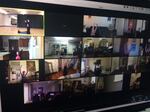Many colleges and universities in Oregon have opted for a mostly online fall term, including Southern Oregon University in Ashland. Although it’s safer to teach at a distance to prevent the spread of the coronavirus, some professors say this new teaching environment has them stressed and discouraged.
Many professors at SOU expressed relief when the campus announced this summer that most courses would be taught online. Nonetheless, they say this new teaching environment has shown to be stressful and time-consuming.

Southern Oregon University dance instructor Suzanne Seiber (top left) teaches a musical theater dance course to students through Zoom during the spring term, when professors had to suddenly shift their courses online.
April Ehrlich / JPR News
“I don’t think I’ve ever worked more hours,” says Associate Professor of Education Jesse Longhurst, reflecting on the Spring term.
For one, there are technical challenges — like uploading materials to the web, learning new software, and helping students access and understand that software. But Longhurst found that there was an additional toll to teaching during a pandemic.
“I spent a lot of time on one-on-one Zoom calls with students in tears, trying to find homeless students housing,” Longhurst says. “There was just a lot of need.”
Like Longhurst, many professors found themselves working more than ever this spring when they were told that they needed to move their classes online over spring break. Many found that their courses aren’t easy to teach online.
“I didn’t get into this job to teach this way,” says SOU professor Kemble Yates, who teaches mathematics. “I don’t enjoy this, I don’t think it’s as effective. Most of us didn’t choose this way of doing education, and don’t particularly like it.”
Yates says he’s prepared for another heavy workload this fall. But he’s not sure what will happen after that.
“If I have to do this all year next year, I may well consider leaving a year early,” Yates says. “And I’m certainly not the only person thinking this way.”
Nonetheless, a lot of SOU professors say distance learning is the safest option, even if it comes with a heavier workload.
“We are not frontline workers. We’re not physicians. We’re not nurses,” says SOU associate professor of philosophy Devora Shapiro. “We are professors and teachers and if it’s possible for us to do what we need to do without taking on physical risk, that should be a given.”
Administrators at universities across Oregon and the country are having to weigh safety against budget concerns. Surveys suggest that college students want an in-person fall term, despite the health risks. So going fully online could impact enrollment, which would decrease revenues in an already tight budget.
This comes at a time when universities have become more reliant than ever on student enrollment and tuition fees.
“Across the last couple of decades, public institutions, in particular, have been experiencing reductions in state funding,” says SOU Provost Susan Walsh. “We don’t have many options.”
Walsh says SOU has secured extra funding to provide professional development and training opportunities to professors so they can learn how to manage this new workload. Even so, many faculty say they’re running on empty.
“I am 100 percent burned out and so is everyone I know,” says SOU digital media professor Andrew Gay. “I think that all of us are still pretty much in crisis mode of knowing that we have these really difficult tasks.”
Gay says he doesn’t think there’s an easy solution to prevent faculty burnout. No matter what, whether classes are taught in-person or online or a mix of both, this fall isn’t going normal. There will be face masks and social distancing, Zoom calls and technical problems. There will be students struggling with food insecurity or housing or health. And faculty will be there to help them, even if it’s from a computer screen.